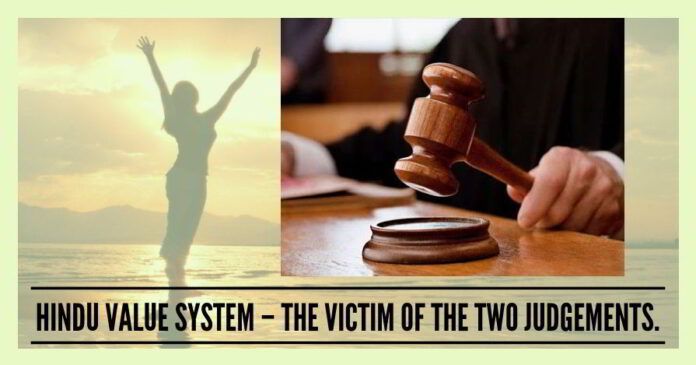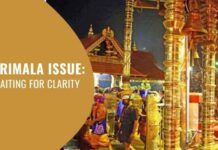
With Justice Indu Malhotra being the only voice reflecting the values dear to the Hindu women, is it time we must demand all-women bench to hear the cases that affect all women.
The two recently passed judgements by the Supreme Court of India, one on adultery and the other on the entry of women of menstruating age into the Sabarimala temple are supposed to have set right the wrongs done to women. The first one has decriminalised adultery for the sake of ‘gender neutrality’, for, now the woman committing adultery is released from the clutches of her husband as her paramour no longer requires the permission of her husband to commit adultery! So the judgement has relieved the woman from being treated as the property of the man. The second judgement is said to have ensured ‘gender equality’ by eliminating a discrimination against women imposed by patriarchal religious practice.
The Hindu majority is still steeped into the value system of mutual fidelity and the lawgivers are expected to reflect that system and not create ways to encourage violation of the marriage oath.
The media is agog with stories for and against these two judgements but what is missed out is that both the judgements have trampled upon the value system of the majority of people of this country. Experts would come out with jargons and judicial terms to support the judgements, but as a layperson, I would say that any judgement should be representative of the value system of the country. It is to protect these value systems we have the judiciary and not to derail them.
The value system at the receiving end in the adultery verdict is the age-old and still continuing the concept of the marriage oath in the Hindu society which is centred on “Saptapadi”, the seven steps. The man and the woman enter into a lifelong commitment to each other by taking seven vows in seven steps in which the 3rd vow is on fidelity to each other. The completion of the seven steps with seven vows makes the marriage legal in the Hindu society. One of the vows being fidelity, adultery committed by any one of the two must be considered as a crime. Only when the element of criminality is included, any temptation to commit the crime can be nipped in the bud. Law is not just meant for giving justice but also to play deterrence. However, the judges turned into social scientists when they announced their discovery unsupported by data that adultery is not the cause of unhappy marriage but the result of unhappy marriage!
Section 497 by itself is a violation of the Saptapadi vow and by scrapping it the violation has been remedied but the crime is not checked. None of the judges except the lone female judge Justice Indu Malhotra seemed to have realised the aberration caused by scrapping the section when she questioned whether adultery can be brought under criminal offence, but restricted it to situations “where there is a public element in the wrong, such as offences against the State security and the like.”
One is at a loss to understand why this is not applicable to the entire society. The Hindu majority is still steeped into the value system of mutual fidelity and the lawgivers are expected to reflect that system and not create ways to encourage violation of the marriage oath. The first victim of this verdict is reported from Chennai. The husband had no qualms in telling his wife that she could not stop him from having an affair, by quoting the SC verdict on adultery. The CJI claimed in his ruling that adultery could be a ground for divorce. But the poor woman could not understand how sympathetically the court had devised ways for her benefit! She committed suicide instead. Ethically who is the first abettor for this suicide?

Today in the name of equality women are brainwashed to do everything that men do which is in addition to what they do as women only.
The second judgement pertaining to Sabarimala pilgrimage was justified by CJI Misra on the basis of ‘gender equality’ and aimed at demolishing patriarchy in religion. Referring to the restriction on menstruating women he said, “Any rule based on biological characteristics cannot pass muster of constitutional test.” If the issue is about the biological characteristics of the woman, did he or anyone in the Bench care to assess the impact of those biological characteristics on women due to the pilgrimage? Without doing that they have just passed a verdict that is once again a travesty of the value system of the Hindu society.
This value system takes utmost care of the woman’s health and had done the needful to reduce menstruation related health issues which modern science has not even thought of. Women were kept away from all chores on those days not because they are unclean but they needed rest. The impact of physical work was only recently acknowledged by sports committees on seeing that nearly 25% of the elite athletes suffer from menstrual dysfunction. A Consensus Statement on treatment and return to play was made in the US only in the recent years. In contrast, the age-old Ayurvedic system of India has remedies in the name of Rajaswala paricharya which is common household knowledge in India even today though it is on the wane in modern households.
The effect of going away from the traditional system of rest is felt in the reproductive disorder commonly understood as an ovarian cyst. Recently a study by AIIMS claimed that one out of four women in the reproductive age is suffering from the ovarian cyst (PCOS). Though no study exists to relate it to the changing lifestyle in disregarding the Rajaswala Paricharya, a comparison can be shown with the women of the past generations, our own grandmothers. They had produced not less than five children each, many a time more than that number. But today a quarter of the women population of India is not able to reproduce due to PCOS. What could be the reason for this sudden deterioration within a span of two generations? The only difference exists in the way the present generation treats their menstruation period.
Today in the name of equality women are brainwashed to do everything that men do which is in addition to what they do as women only. There is a gender inequality by Nature in women that nearly 80% of women are undergoing health-related premenstrual symptoms according to a publication which no man undergoes. Can the judiciary find a remedy to this inequality?
Recently in an article to Live Science, the researcher, Dr Hilary Critchley with more than 40 years of standing in the study of menstruation lamented that the implications of menstruation on women’s health are not at all being studied. Such being the status of the academic understanding of this biological issue of the woman, out honourable judges are able to pass judgement on the biological issues of a woman in an issue which would primarily impact her health – if she takes up the arduous austerities and a long journey by foot to Sabarimala. Opponents would easily come up with a solution to cut short the austerities and the journey. But that is a blatant interference in the right to religious practices.
The austerities of Sabarimala pilgrimage is such that woman in reproductive age cannot follow them and make a trip without harming her health.
The value system under discussion is not just the care for the menstrual health of the woman in the Hindu society but also the respect for temple culture that is in vogue for a known period of more than 1500 years in South India. The temple culture is the Heritage of our country and age-old rules are still being in vogue, one of them being non-entry of women during menstruation period. If this is termed as pollution, yes it is.
Biologically dead material including the dead ova is being expelled from the body during menstruation. Anything dead-related is not allowed near the temple. For example, if a person dies in the close proximity of a temple, the temple would be closed until the dead are taken away. Even if someone dies at home, the occupants of the house would not go to the temple for a stipulated number of days. From this, we can even reason out why temples are closed at the time of eclipses which are supposed to be the best time for offering oblations to the departed ones. From the rationale of abstinence of women from entering the temple during menstruation, we can assume that similar effect on the temple-chemistry is anticipated during the supposed-arrival of departed ones.
This kind of abstinence is more about retaining the temple’s sanctity than about a stigma on the women or others. Even rivers are said to have menstruation period according to traditional Hindu wisdom, which is nothing but the early period of fresh arrival of waters in the rivers (in the month of June). The first waters would be bringing in a lot of dirt spread on the until-then dry river bed. So it is better not to use that water. Only after the water starts flowing well in the next few days, the river is said to have finished her menstruation. The practices are no doubt well-thought out but lack of knowledge of the inner purport makes us think that they are absurd dogmas.
All Hindu theistic women respect this culture and voluntarily refrain from going to temples during their menstruation period. The austerities of Sabarimala pilgrimage is such that woman in reproductive age cannot follow them and make a trip without harming her health. Such deep thoughts had gone into devising the rules of this pilgrimage by our ancestors. It is regretful that the judiciary is not standing up as a custodian of these values. With Justice Indu Malhotra being the only voice reflecting the values dear to the Hindu women in both the judgements, one is tempted to ask if it is time we must demand all-women bench to hear the cases that affect all women.
Note:
1. Text in Blue points to additional data on the topic.
2. The views expressed here are those of the author and do not necessarily represent or reflect the views of PGurus.
- Was Taj Mahal a Hindu temple or a palace or part of a twin temple? - November 13, 2023
- Does Agnihotra Homa offer protection from Corona Virus? - March 21, 2020
- Kejriwal owes his victory to MK Formula – the Coronavirus of Democracy! - February 14, 2020











With respects and due apologies to the author, I am writing this note through a joke to emphasize as to why one should follow the path prescribed by the Nature. One rationalist woman, who is having faith in God, like party leaders in present day DMK Party of Tamil Nadu, as and when need arises, prayed before God and demanded that in a conjugal act both men and women are involving / enjoying in procreating activities and how come women alone have to bear the unbearable pain while begetting the child/baby after 9/10 months of painful pregnancy and bear the labour pain during delivery, whereas the men who were responsible for impregnating the seed in women, are going around and staying carefree after the conjugal act, non challantly. It is totally unfair and against the Women. God thought for a while, after deep thinking, the God said there appears to be some justification in your prayer. When men and women are equal, they ought to share the joy and pain severally and equally. God said to the rationalist activist Woman, there is some MERIT in your argument and the God requested the Rationalist Woman to suggest the way out / remedy for this problem, consistent with Gender equality, so that God can think of granting her the boon immediately and set right the alleged anomaly and as a result that will become the Universal law henceforth.
The Rationalist Woman suggested that Men because of their genital composition cannot given delivery of baby, it is Women alone, who can do the act of giving delivery to a baby or babies in a row, because of the nature of genital possessed by them. However, I request and demand that hence forth, Women would continue to give birth / delivery of babies, but the labour pain of giving birth to a baby or babies MUST be felt and borne by a person, who was responsible for the birth of the baby or babies.
God after deep brooding said OK, you shall have it as you desire. God said, I henceforth declare that the law of procreation of children shall be amended forthwith and accordingly Women will continue to give birth to baby or babies, however the pain suffered by them during the course of giving birth to new born baby or babies are henceforth to be COMPLETELY BORNE and FELT by the Man who was responsible for impregnating the seed in the Woman’s ovary. After some time, this very same RATIONALIST, GENDER EQUALITY DEMANDING WOMAN got pregnant and on the fateful day of delivering the baby, her husband was standing by her side COMFORTABLY without feeling the labour pain, whereas her next door neighbour was sobbing, vailing, howling and seething with unbearable labour pain. On realising her folly, the Rationalist & Activist Woman immediately prostrated, implored before the God to Change the law of nature instantly and restore it to STATUS QUO ANTE, as it was earlier, whereby delivery child and labour pain are felt & borne by the Women, who is delivering the baby or babies.
In the same way, the unwritten law of nature will certainly give a well deserving lesson to the present day activists and rationalists, in the case of menstruating women entry in Sabarimala temple and decriminalising adultery under Sec 497. Hindu faith, customs and traditions are always attuned to scientific basis and well based on nature. Let us hope that Nature is the great healer and leveler.
LOL
If the judges have observed that “prohibition on women is not an essential part of Hindu religion”, they knew a Hindu woman’s right to pray is not prevented in a larger context. Despite the freedom to pray to Lord Ayyappa at the comfort of their home or at other temples, their insistence to go to Sabarimala, could be construed to be due to the sanctity of that place (thanks to collective faith and rituals practiced over centuries). Hence, it is not rational to rule that the petitioners can visit that famed place without any regard for those responsible for its sanctity. By arguing that woman’s menstruation should not affect the 41-day ritual, the judges have donned the mantle of high priests to prescribe a new religious practice at Sabarimala. Certainly, the separation of state and religion professed in the secular constitution, has been violated based on illogical “untouchability” argument.
I believe number of factors could have contributed to this unfortunate verdict:
(a) The various defendant’s lawyers arguing from various angles without giving a coordinated and cogent argument
(b) They did not explain the concept of cleanliness (both bodily and mentally) and faith driven rituals in South India , which many in North India do not understand. Perhaps Justice Malhotra understood this because of her tenure in Chennai High Court. For example, in many temples in North America run by North Indians or Indian decedents from West Indies / Carribean, memorial services are held within few days of death of a member. In south Indian temples (in India or North America) this is unthinkable. The judges refused to believe that this is due to religious faith/rituals not a vile plot to discriminate. If personal belief system plays a role in such instances is any one’s guess.
(c) Statements from some judges suggest that they may have interpreted the constitution as per their view of constitution as a “transformative” document. It is not clear if any of the defendants lawyers anticipated this and forcefully argued to dissuade the judges from going along this path.
Let us hope that there is a procedure to appeal to hear this by a larger bench, using the dissent from Justice Malhotra, poor justification for the verdict, and unconstitutional encroachment into religious faith.
It is paining to see lot of support for the Supreme court’s judgement on the entry of ladies in the age of menstruation. One person is writing in rediff.mail page about his experience with his father’s awkward cooking during his mothers menstruation period etc.!!!!!! in support of this. Our forefathers are not fools to put certain restrictions in certain aspects of nature, which are beyond our imagination. They have done this with their foresight.
1. Spraying cow dung water outside the house and also inside for cleaning in the morning, was not appreciated earlier and now the science says they eradicate germs and we follow it.
2. They have said with foresight that vembu leaves to be used for removing germs during small pox and we followed and science accepts it now.
3. Our forefathers warned about problems to pregnant ladies about being exposed to Eclipses and now science says certain rays are harmful. More discoveries are possible.
4. If a menstruating woman passes through Tulsi plant, it is not growing, which can be seen even to-day.
5. Our Vedas, Sastras, Puranas are not mere stories and they are the teachings, for the way of life for us.
6. The centre of erstwhile temples are designed by our Rishis and we have to follow the rituals and restrictions imposed by them with reverence, with out questioning, to derive the benefits. Otherwise, we may not get that. That is all.
7. The simple court knowledge and the legal arguments on the basis of the laws enacted by humans, will not bear any fruits.
8. People are not supposed to enter Garbagraha irrespective of caste or creed. Will court interfere in such principles, which were followed even by erstwhile kings and publics.
9. Why do Ministers and Judges takes oath on the basis of God, Bagavath Geetha or Kuran? Should this be dispensed with?
10. People should come up in great numbers to oppose such human right, Ladies right, Gents right groups and follow the tradition without break, so that at least the future generation will reap the benefits by their scientific discoveries to support the forefathers diktats, with their new scientific equipment, which are not available now. Otherwise we have to face many natural calamities in future.